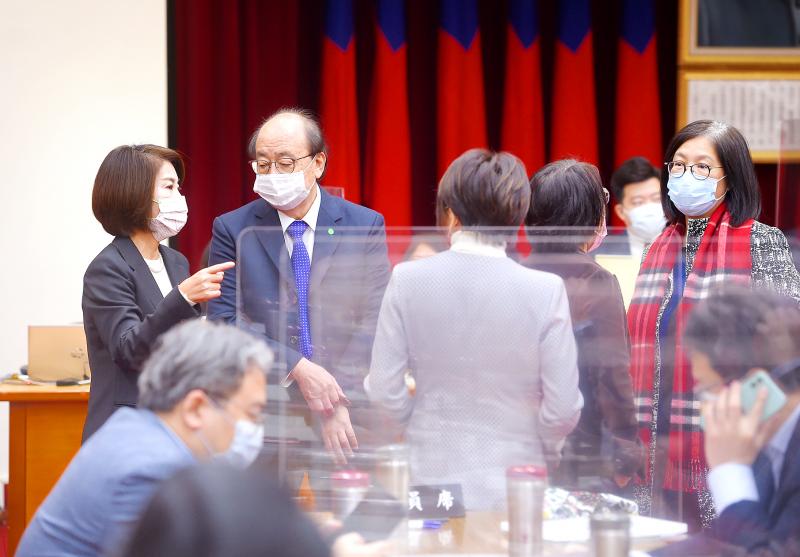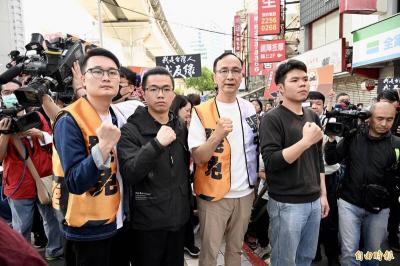The opening session of the Constitutional Amendment Committee at the legislature in Taipei got off to a rocky start yesterday, with Chinese Nationalist Party (KMT) lawmakers storming out soon after it began.
Democratic Progressive Party (DPP) lawmakers gathered for the inaugural session at 9am while their KMT counterparts arrived shortly afterward, followed by Taiwan People’s Party representatives.
KMT members said that they objected to DPP Legislator Chou Chun-mi (周春米) being chosen as convener before they entered.

Photo: Fang Pin-chao, Taipei Times
They accused the DPP of breaching legislative regulations governing committee meetings.
DPP Legislator Chung Chia-pin (鍾佳濱) said that proceedings had conformed to the regulations and members had reached quorum, so he and DPP Legislator Kuan Bi-ling (管碧玲) raised the motion to nominate Chou, which was approved by those who were present.
KMT Legislator Jessica Chen (陳玉珍) said her party members were only one minute late.
KMT members then exited the meeting in protest, saying that it was a DPP ploy to breach the regulations, derailing the process of constitutional amendments.
“We had quorum and complied with regulations to nominate a convener,” Chung said. “Were the KMT in charge, we would abide by the procedures, allowing it to nominate a convener.”
“As members of the ruling party, we respectfully listen to suggestions and opinions of opposition members, so I ask that the KMT members return and do the work at this committee,” he said.
Later yesterday, the KMT at a news conference accused the DPP of not wanting the meeting to get started, so it orchestrated a way to halt proceedings while blaming the KMT.
The caucuses on Sept. 14, 2020, agreed to set up the committee amid calls to amend the Constitution, including a proposal to lower the voting age from 20 to 18.
The 39 members of the committee were named after seats were allotted to parties based on their proportion of seats in the legislature.
Additional reporting by Chen yun and CNA

The Ministry of Economic Affairs has fined Taobao NT$1.2 million (US$36,900) for advertisements that exceeded its approved business scope and ordered the Chinese e-commerce platform to make corrections in the first half of this year or its license would be revoked. Lawmakers have called for stricter supervision of Chinese e-commerce platforms and more stringent measures to prevent China from laundering its goods through Taiwan as US President Donald Trump’s administration cracks down on origin laundering. The legislature’s Finance Committee yesterday met to discuss policies to prevent China from dumping goods in Taiwan, inviting government agencies to report on the matter. Democratic Progressive Party

Taiwan and its Pacific ally Tuvalu on Tuesday signed two accords aimed at facilitating bilateral cooperation on labor affairs, according to Taiwan’s Ministry of Foreign Affairs (MOFA). The governments inked two agreements in Taipei, witnessed by Foreign Minister Lin Chia-lung (林佳龍) and visiting Deputy Tuvaluan Prime Minister Panapasi Nelesone, MOFA said in a news release. According to MOFA, the agreements will facilitate cooperation on labor issues and allow the two sides to mutually recognize seafarers’ certificates and related training. Taiwan would also continue to collaborate with Tuvalu across various fields to promote economic prosperity as well as the well-being of their

The Taipei District Prosecutors’ Office has continued its investigation into allegations of forged signatures in recall efforts today by searching the Chinese Nationalist Party’s (KMT) city chapter and questioning several personnel including the chapter director, according to media reports. Among those questioned and detained were KMT Taipei chapter director Huang Lu Chin-ju (黃呂錦茹), chapter secretary-general Chu Wen-ching (初文卿), chapter secretary Yao Fu-wen (姚富文) and first district committee executive director Tseng Fan-chuan (曾繁川). Prosecutors said they would not confirm reports about who had been summoned. The investigation centers on allegations that the ongoing recall campaigns targeting Democratic Progressive Party legislators Rosalia Wu (吳思瑤)

Several Chinese Nationalist Party (KMT) officials including Chairman Eric Chu (朱立倫) are to be summoned for questioning and then transferred to prosecutors for holding an illegal assembly in Taipei last night, the Taipei Police said today. Chu and two others hosted an illegal assembly and are to be requested to explain their actions, the Taipei City Police Department's Zhongzheng (中正) First Precinct said, referring to a protest held after Huang Lu Chin-ju (黃呂錦茹), KMT Taipei's chapter director, and several other KMT staffers were questioned for alleged signature forgery in recall petitions against Democratic Progressive Party (DPP) legislators. Taipei prosecutors had filed